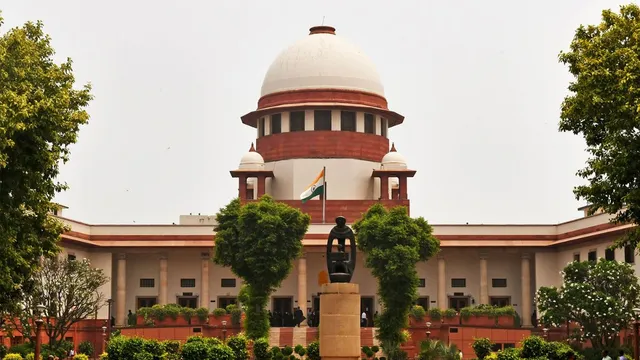- By ANI
- Wed, 19 Nov 2025 08:24 PM (IST)
- Source:ANI
The Supreme Court on Wednesday agreed to hear a batch of pleas challenging certain forms of talaq prevalent among Muslims, which are allegedly discriminatory towards wives. After having heard arguments from two petitioners, a bench led by Justice Surya Kant listed the matter to be heard on November 26, Wednesday.
The Court was hearing arguments in the case of journalist Heena Benazir, who is one among a batch of petitioners. Benazir has alleged that her husband attempted to divorce her through a Talaqnama sent by his lawyer, without pronouncing talaq himself. She argued that this method violates both Islamic practice and her rights.
Her counsel submitted that the 11-page Talaqnama lacked the husband's signature and that the Talaq was allegedly granted by someone other than the husband. She further stated that such a practice exposed her to the risk of being considered married to two men simultaneously if she were to remarry.
"Her life is at stake," the lawyer told the court, arguing that an invalid talaq could force her into a situation "akin to polyandry."
The court was informed that Benazir's husband had already "moved on," remarried another woman and even had a child from the second marriage.
Senior Advocate MR Shamshad, appearing for the respondent-husband, argued that such delegation of talaq is a prevalent practice in Islam.
The Bench, however, expressed strong reservations about the same. "The problem is between you and her. How is this innovative discriminatory practice being invented? Somebody appoints somebody... A husband can even delegate his own wife, but how can a lawyer pronounce talaq for him? Is he carrying such an ego that he cannot even propose to divorce his wife directly? Whatever is the best religious practice, he must comply with it. Is this the dignity of a woman that we maintain?" Justice Surya Kant said.
The Court further remarked that the husband cannot have the right to enjoy his own life while destroying his wife's.
The Bench assured the petitioner that it would seriously examine the issue, adding that "Talaq-e-Hasan, as of today, exists, but we will have to see to what extent interference is required.
In Talaq-e-Hasan, unlike Talaq-e-Biddat (instant triple talaq), the husband does not pronounce talaq three times at once. Instead, he pronounces it once in each of three successive months.
The Supreme Court had struck down the practice of Talaq-e-biddat in 2017, finding it unconstitutional.
Another petitioner, Nazri Nisha, appeared in person and narrated her circumstances, stating that her husband attempted to divorce her in a similar irregular manner. She described difficulties in obtaining school admissions, passports, and accessing welfare schemes for her five-year-old child because the alleged talaq document lacked her husband's signature.
After hearing her submissions, the apex court advised her to file an application detailing all the issues she was facing, so that directions could be issued to ensure the child's education and to protect her life and dignity.
The Court granted permission to file such an application and observed that specific directions appear necessary for the welfare and protection of the woman and child.
The Court also directed the respondent husband to remain present on the next date of hearing and to ensure that the respondent follows the lawful practice for obtaining a valid divorce.
The matter will be taken up next on the 26th, where the apex court will examine the validity of talaq practices.
(Disclaimer: Except for the headline, this article has not been edited by The Daily Jagran staff and has been published through syndicated feed by ANI.)

